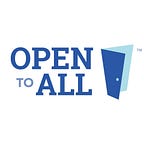Why paid leave matters: How companies can support their people during COVID-19 and beyond
Decades of research have demonstrated the benefits of paid sick days and paid leave policies to employers, workers, public health, and economic growth.
This blog post is authored by the National Partnership for Women & Families (NPWF), a proud member of the Open to All Advisory Council. NPWF outlines their best practice recommendations for businesses considering implementing and expanding their paid sick days and paid leave programs.
During this public health crisis, working people are facing unprecedented challenges. Many are balancing their physical and mental health needs with caregiving obligations, while others continue to work or cope with reduced hours or lost jobs. Employers are struggling with how to support their workforce, sustain their businesses, and safely reopen their workplaces as the pandemic continues to affect millions nationwide.
There are many steps that employers can take to support their workforce and improve the stability of their business. One vital step is providing strong and inclusive paid sick days and paid family and medical leave policies. These policies ensure that companies can retain experienced and talented workers and better protect the health and productivity of their workplaces. Employers can also support ongoing efforts to pass strong state and federal paid leave policies, as dozens of leading companies have done.
Decades of research have demonstrated the benefits of paid sick days and paid leave policies to employers, workers, public health, and economic growth. While the value of paid sick days and paid leave are well documented, tens of millions of working people do not have access to these basic protections. During this time of crisis, the cost of not having these policies in place has rippled across the economy. COVID-19 has spread in workplaces where people have no choice but to show up, even if they have been exposed to COVID-19 or are experiencing symptoms. For some businesses, the impacts have been profound as the pandemic has rippled across their workforce or the larger communities in which they operate.
People in desperate need of their paychecks have had to reduce hours or leave their jobs because they lack paid leave to care for a loved one, a child out of school, or their own health needs. Even in workplaces that have paid sick days or paid leave policies, workers may be unsure of the policies or fear retribution for using them.
Paid sick days and paid leave are also racial and gender justice issues: as the pandemic disproportionately impacts communities of color, women of color are less likely to have access to these protections yet often have a greater need to provide family caregiving.
During the pandemic, there are best practice emergency policies that employers should implement to expand access to paid leave and paid sick days quickly, equitably, and in accordance with public health recommendations. Notably, recent federal legislation has expanded paid sick days and paid leave protections to millions of working people — and employers that are required to provide these benefits will be reimbursed. Find out more here.
Companies should consider going beyond what is required by law and implement best practice paid leave policies. These are recommendations that research has shown would significantly benefit vulnerable employees and their families and help keep workplaces safe and productive:
- Provide Emergency Paid Sick Days to ensure all workers can take sufficient time to recover from COVID-19, to quarantine if exposed, and to care for family members who are sick. This includes providing at least 80 hours of emergency paid sick time to full-time workers (pro-rated for part-time workers), and it should be immediately available for use. (Note: Because of the nationwide difficulty in obtaining tests and medical care, employers that require a worker to test positive for COVID-19 or obtain a doctor’s note in order to utilize paid sick days risk having workers who cannot meet these requirements and come to work sick.)
- Provide Emergency Paid Family and Medical Leave for all workers who need longer-term leave to recover from COVID-19, to care for someone who is recovering, or to care for someone who is unable to access their typical school or care setting due to the pandemic. This includes at least 12 weeks of job-protected emergency paid leave to be used during the pandemic for all full-time workers (pro-rated for part-time workers), providing full replacement of the workers’ typical pre-pandemic wages, particularly for workers paid lower wages.
Beyond the pandemic, health and caregiving needs are universal — and are projected to increase alongside our aging workforce and the growing “sandwich generation” of workers who have to care both for their children and their aging parents. Employers should implement strong and inclusive permanent paid sick days and paid leave policies. This includes providing at least seven paid sick days and at least 12 weeks of paid family and medical leave for all the purposes covered in the Family and Medical Leave Act.
Across industries, small and large businesses continue to implement and expand their paid leave policies. For example, Open to All member Levi Strauss & Co. recently expanded its paid leave policy to include an industry-leading paid family leave policy that provides employees — both salaried and benefits-eligible hourly workers — with up to eight weeks of paid time off per year to care for an immediate family member with a serious health condition. The policy builds on their 2016 paid parental leave policy, which provides eight weeks to care for a new child.
These policies are fundamental to improving racial and gender equity in the workplace. And when employers invest in protecting their workers, they contribute to the growth of our economy, the strength of our recovery, and the health and stability of our workforce.
